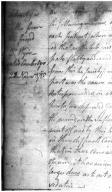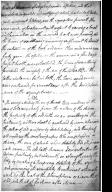[ Dr. Wyer's Treatment for Lockjaw ] Dr. William James Almon
Date: 1785/11/23
Source:
Manuscript Notebook of Dr. William James Almon
Institution: Nova Scotia Archives
| Source Origin: Almon Family Fonds
| Reference: MG 1 / Microfilm Reel 10,045
Instructions from a letter by Dr. Wyer of Cambridge MA for successfully treating lock jaw (tetanus) with cantharides followed by a bark tonic, wine, and cold baths, p. 73.
MARGIN:
Extract
Letter from
My friend
Dr. Wyer
dated Cambridge
23 November. 1785
A Physician in the United States cures the lock jaw in
the following manner. Upon inspecting the wounds of
each patient | when wounds was the cause | he ever observ-
-ed that as the lock jaw came on, the wound became
pale flabby and ceased to discharge proper matter,
from this he /wisely/ concluded debility in the wounded
part was the cause. he laid aside his opiates and
antispasmodics, on which you know every one has
heretofore depended & wisely applied Cantharides to
the wound, as the Inflammation returned the lock jaw
went off and by this treatment he has succeeded
in three different cases. He thinks from this discovery
that in those cases where benefit has been derived from
opium, it has arisen from it being given in such
large doses as to act as a stimulus not as a
sedative.
Occasional occurrence of slight spasmodic afflictions, and that
remarkable inquietude and restlessness which particularly distin-
-guish incipient tetanus, were the symptoms present. The
same mode of treatment with respect to raising a local
inflammation in the wounded part, was pursued, and
the power of swallowing remaining sufficient to admit
the exhibition of the bark and wine these medicines were
freely given. The effect was the same: in a few days
perfect health was established. The power of swallowing
precluded the necessity of the use of the Coldbath; in the
latter instance: but in both, the tonic medicines
were continued for several days after the disappear-
-ance of the symptoms_._
Note
*The success attending the use of the cold tonic remedies, in the
cure of Tetanus, clearly proves the nature of the disease.
the propriety of the cold bath as an auxiliary in the
treatment, will no doubt be questioned by some who consider
the action of cold uniformly debilitating, and therefore of
all remedies the most improper to be employed in a
disease, the cure of which shews debility to be its proxim-
-ate cause. The cold bath however does not act in this
disease positively, but indirectly in strengthening the
body, by creating a temporary debility of the system,
and increasing its sensibility to external stimuli.
such as the heat of the Atmosphere or warmth of
a bed, and that of frictions after its use. --
Download: Transcription | Images

